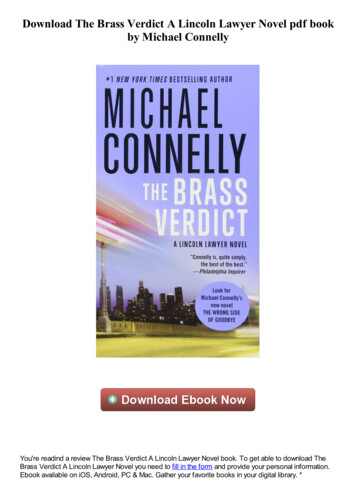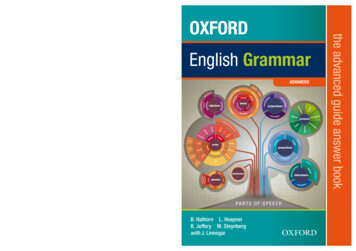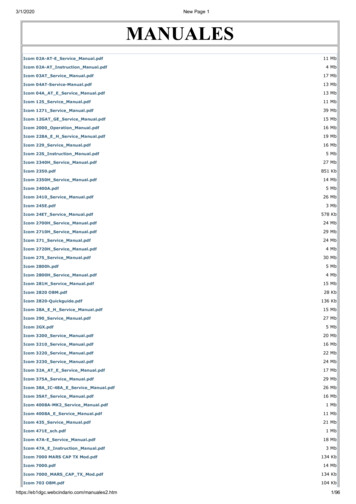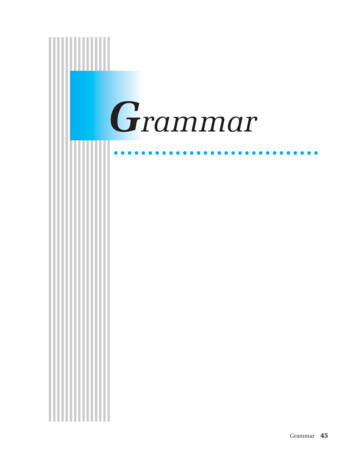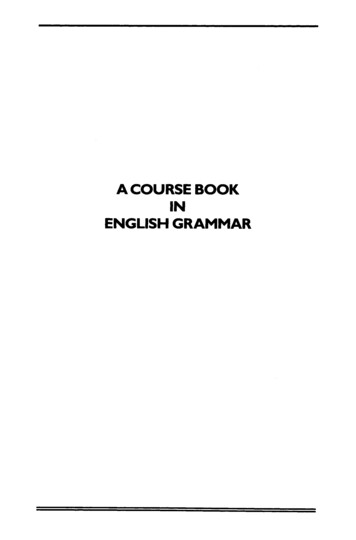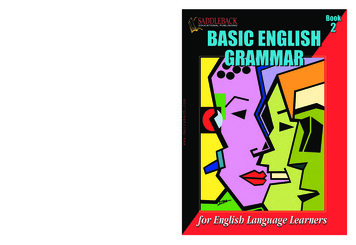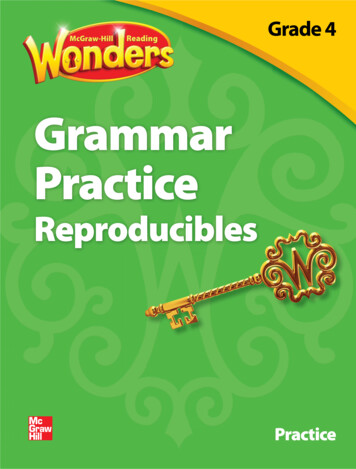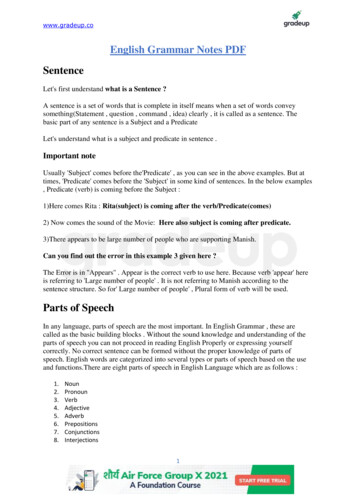
Transcription
www.gradeup.coEnglish Grammar Notes PDFSentenceLet's first understand what is a Sentence ?A sentence is a set of words that is complete in itself means when a set of words conveysomething(Statement , question , command , idea) clearly , it is called as a sentence. Thebasic part of any sentence is a Subject and a PredicateLet's understand what is a subject and predicate in sentence .Important noteUsually 'Subject' comes before the'Predicate' , as you can see in the above examples. But attimes, 'Predicate' comes before the 'Subject' in some kind of sentences. In the below examples, Predicate (verb) is coming before the Subject :1)Here comes Rita : Rita(subject) is coming after the verb/Predicate(comes)2) Now comes the sound of the Movie: Here also subject is coming after predicate.3)There appears to be large number of people who are supporting Manish.Can you find out the error in this example 3 given here ?The Error is in ''Appears'' . Appear is the correct verb to use here. Because verb 'appear' hereis referring to 'Large number of people' . It is not referring to Manish according to thesentence structure. So for' Large number of people' , Plural form of verb will be used.Parts of SpeechIn any language, parts of speech are the most important. In English Grammar , these arecalled as the basic building blocks . Without the sound knowledge and understanding of theparts of speech you can not proceed in reading English Properly or expressing yourselfcorrectly. No correct sentence can be formed without the proper knowledge of parts ofspeech. English words are categorized into several types or parts of speech based on the useand functions.There are eight parts of speech in English Language which are as follows positionsConjunctionsInterjections1
www.gradeup.coWhy Parts of Speech are important : Until and unless you are well acquaint with the Noun , Pronoun , Verb , Prepositions etc ,you cannot command in English Language.Reading comprehension , Sentence connector , sentence correction Everything may improveif you will be able to quickly distinguish subject from direct object and objects of prepositionetc.Parts of Speech refers to all words in the English language and how they can be grouped intoeight different categories, depending upon their function.Phrases and ClausesPhases and clause holds a major significance in English Grammar. Most of the times inexamination the errors are in the phrase and clause of the sentence.First let's understand Phrases :A phrase is a group of words which stand together as a single unit. The phrase may have anoun , but it does not have a subject doing a verb(action) . Because a phrase does not containa subject doing a verb , so it can't convey a complete message. Look at the below examples :1. A ten foot long flag2. Moving behind a car3. The lost puppyAs you can see , above statements are not conveying any complete thought or idea. Hencethey all are phrases.There are many types of phrases which are :1. Noun Phrases: A noun phrase contains noun and the words which modify that noun , forexample : A sick little boy2. Verb Phrase: A verb phrase is one which contains verb and it's modifiers . for example :He was eager to know the story3. Infinitive Phrase : An infinitive phrase is a noun phrase that begins with an infinitive. forexample , I went to Kerela to explore new places.4. Prepositional Phrases : A phrase which begins with a preposition and can act as a noun,an adjective or an adverb , is known as a Prepositional Phrase. For example : It rained for awhileAs you can see examples above (bold part) are not conveying any complete thought. Nowlet's see some of the common errors of Phrases :1- I am looking forward to seeing you soon. (Incorrect)I’m looking forward to see you soon. (Correct)2
www.gradeup.coClause :A clause is a group of words that includes a subject and a verb. It means a clause has a verbwhich is actively doing a verb(action) . A clause can be distinguished from a phrase, whichdoes not contain a subject and a verb.Clause are of two types : Independent Clause and Dependent clauseAn independent clause is one which expresses a complete thought and can be a standalonesentence.While a dependent clause is usually a supporting part of a sentence, and it cannotstand by itself as a meaningful sentence/idea.Examples : 1. Rita went to market after she watched the movie.In this sentence , 'Rita went to market' is a complete sentence in itself hence it is aindependent clause. While 'After she watched the movie' is a dependent clause as it can notbe a complete sentence or idea, which means it is dependent on the first sentence.2. I went to the Market : Independent ClauseVerbVerb is defined as a word which is used to describe an action, state, or occurrence, andforming the main part of the predicate of a sentence. Verbs always express activity , whethermental activity or physical activity .Verbs are a necessary component of all sentences. Verbshave two important functions: Some verbs put stalled subjects into motion while other verbshelp to clarify the subjects in meaningful ways.Some examples of Verb are : Hear ,Listen ,Laugh , Speak , Cry , Eat etc.Examples : The lady ate the cake ,Here ate is the verb and the word which shows the action of thesentence.The woman is lying on the bed .even though the action doesn't show much activity, lying isthe verb of the sentence.She is a intelligent girl, there is no action but a state of being expressed by the helping verb'is'.Verbs change their form :Most of the other parts of speech do not change their time with respect to the tenses,but verbs change their form. Some verbs are ended by adding 'ed' (Talk - talked) and someverbs end in a completely different way (teach-taught). The different forms of verbs showdifferent meanings related to such things as tense (past, present, future), person (first person,second person, third person), number (singular, plural), and voice (active, passive). Verbs arealso often accompanied by verb-like words called modals (may, could, should, etc.)and auxiliaries(do, have, will, etc.) to give them different meanings.3
www.gradeup.coVerbs has a relationship with time :One of the most important things about verbs is their relationship to time. With the form ofverb , we can know if something has already happened, if it will happen later, or if it ishappening now. For things happening now, we use the present tense of a verb; for somethingthat has already happened, we use the past tense and for something that will happen later, weuse the future tense. For example : She is dancing (This form of verb is telling that action is currently in progress)She danced (This form of verb is telling that action was in past)She will dance ( (This form of verb is telling that action will happen in future)Different types of Verb :Regular Verb and Irregular Verb :The verbs like'Dance' used in the sentence ,in which we make past tense by adding d or -ed are known as regular verbs. For example rustedTalkTalkedTalkedThe verbs , in which we do not add -d or -ed to make Past Tense are known asIrregular Verbs , For Example pokenProgressive and Perfect Verb :Apart from regular and irregular verbs , there are also progressive or continuous formswhich show that the action takes place over a period of time, and perfect forms whichshow completion of the action. which are as following :Present ContinuousPresent Perfectis laughinghas laughedis eatinghas eatenis sleepinghas slept4
www.gradeup.coUsually a subject comes before a verb and an object may come after it. The subject is whatdoes the action of the verb and the object is what receives the action.For example ,Riya ate a pizza ,Here Riya is the subject or the one who did the eating and the pizza is the object or what goteaten.Transitive and Intransitive Verb :A verb which has an object is called a transitive verb Means the verbs which cannot be usedwithout an object . For example : throw, buy, hit, love.He throw a stone (Using a stone is a must to define the activity)A verb which do not require an object are called Intransitive Verbs. For example : go, come,walk, listen.He walks (We don't need an object to define activity)Modal Verb :Modal verbs are those verbs which do not change their form (spelling) and they have noinfinitive or participle (past/present). Modal verbs are those verbs which express necessity,possibility , request etc.The modal verbs are can,could , must, may, might, will, would, should, ought to . They areused with other verbs to express ability, obligation, possibility, and so on. Below is a listshowing the most useful modals and their most common meanings:ModalVerbMeaningExamplecanto express abilityI can speak a little Russian.canto request permission/to give permissionCan I open the window? /You canuse my car.couldPossibility for something which has already beendoneIf I had money , I could buy it.mayto express possibilityI may be home late.mayto request permissionMay I sit down, please?mustto express obligationI must go now.mustto express strong beliefShe must be over 90 years old.5
www.gradeup.coshouldto give adviceYou should stop smoking.wouldto request or offerWould you like a cup of tea?wouldin if-sentencesIf I were you, I would say sorry.Ought to to denote moral dutyWe ought o respect our elders.Used toTo denote something that is done in past . but isno longer doneI used to play ludo in my childhood.DareTo denote ChallangeDon't dare to ask favor from me.Some common rules and mistakes of Verbs:1) WriteThe verb write can take two objects. Sometimes this causes problems. Incorrect: He wrote me. (The sense of this sentence is completely incorrect.)Correct: He wrote to me. (This sentence is conveying the right sense.)Look at the below examples to be acquainted with the correct usage of the verb 'Write' :We write something. (He wrote a letter.)We write something to someone. (He wrote a letter to his mother.) (NOT He wrote a letter hismother.)2) ExplainThe verb explain can be followed by two objects – a direct object and an indirect object.Note that we explain something to someone. (NOT We explain someone something.) Incorrect: I shall explain them this.Correct: I shall explain this to them.3) SuggestWe suggest something to somebody. We cannot suggest somebody something. Incorrect: He suggested me this.Correct: He suggested this to me.4) Oblige6
www.gradeup.coThe verb oblige takes the preposition to. When you are obliged to do something, you areforced to do it because it is a law, a rule or a duty. I felt obliged to help him.I am obliged to you for this good turn. (NOT I am obliged of you for this good turn.)5) InviteThe verb invite can be followed by to or for.We invite someone to/for something: I have invited my uncle and aunt to dinner.He invited me for a drink but I politely refused.6) TellThe verb tell does not take a preposition. Incorrect: He told to me to go.Correct: He told me to go.7) AskWhen ask is followed by two objects, the indirect object (the person) normally comes first,without a preposition. Incorrect: She did not ask any question to him.Correct: She did not ask him any question.Incorrect: I will ask the time to that man.Correct: I will ask that man the time.TensesIn Grammar, we use 'Tenses' to define the time of occurring of the action. The tenses in asentence show the time of an action or state of being as shown by a verb. Actions can takeplace in Past state, Present state or future state. So there are 3 main types of tenses which aredefined as follows:Present Tense: The actions which are doing presently are classified into 'Present tense'. Forexample: He is eating Pasta. (Presently he is doing this action of eating)Past Tense: The actions which we have already done are classified into 'Past tense'. He ate Pasta (He has already done the action of eating)7
www.gradeup.coFuture Tense: The actions which we are going to do/will do/planning to do are termed as'Future tense' sentences. He will eat Pasta (He is going to do the action of eating)These 3 tenses are split into 4-4 parts, resulting in total 12 types of Tenses, which aredescribed as following:Present Tense1) Simple Present Tense:This tense is used when we want to describe an action that is happening at present. But this tensedoes not indicate when that action is expected to end. Simple present tense is used when: If an action has regularity, which means if an action happens every day/every time/everyweek/every month/every year, then we use 'Simple Present tense for such actions.To indicate facts that are universally true.Habitual action that happened in past, happening in present and will happen in futureSimple Present TenseAffirmative SentenceNegative SentenceInterrogative SentenceFor Singular Subject: Thistrain leaves at eight in themorning.This train does not leave ateight in the morning.Does this train leave at eightin the morning ?For Plural Subject: Thesegirls go dancing classeverydayThese girls do not go todance class everydayDo these girls go todance class everyday ?Catchwords for Simple Present Tense: usually, often, sometimes, seldom, always, rarely,never, every day, every week , every time , on Mondays, etc2) Present Continuous Tense:If an action that is going on at the time of speaking means if an action is in continuation orprogression at present then we use Present Continous Tense. This is also known aspresent progressive tensePresent continous tense are used when: Some action is happening now while speaking and has a definite end as well.When some action or plan is already decided and arranged as well to perform it at sometime.Present Continuous Tense8
www.gradeup.coAffirmative SentenceNegative SentenceInterrogative SentenceFor Singular Subject : She She is not doingis doing her homework now her homework now.Is she doingher homework now?For Plural Subject: They are They are not doingdoing their homework now. their homework now.Are they doingtheir homework now?Catchwords for Present continous tense : now, right now, this quarter, etc.3)Present Perfect Tense:This tense explains the incident/action that has happened in the past and still it has relevance.Present Perfect TenseAffirmative SentenceNegative SentenceInterrogative SentenceFor Singular Subject: HeHe has not completed hishas completed his graduationgraduation in 2014.in 2014.Has he completed hisgraduation in 2014?For Plural Subject: Theyhave completed theirgraduation in 2014.Have they completed theirgraduation in 2014?They have not completedtheir graduation in 2014.Catchwords for Present Perfect Tense: just, ever, never, already, yet,4)Present Perfect Continous Tense :Present Perfect Continuous Tense is used for a situation that has occurred in the past andwhich continues until that moment.Present Perfect Continous TenseAffirmative SentenceNegative SentenceInterrogative SentenceFor Singular Subject: RiyaRiya has not been going tohas been going to dance classdance class since March.since March.Has Riya not been going todance class since March ?For Plural Subject: I havebeen reading this awesomenovel for two months.Have you been reading thisawesome novel for twomonths?I have not been reading thisawesome novel for twomonths.Catchwords for Present Perfect Contionous tense : for, since, latelyPast Tense5) Simple Past Tense :9
www.gradeup.coTo describe an action of the past , we use Simple past tense. In this tense the verb ends withan '-ed' . Also some verbs end differently , for example for 'eat' , we use 'Ate' in simple pasttense.Simple Past TenseAffirmative SentenceNegative SentenceForRaman did not go for theSingular Subject: Ramanmovie yesterday.went for the movie yesterday.For PluralSubject: They went for themovie yesterday.Interrogative SentenceDid Raman go for the movieyesterday?They did not go for the movie Did they go for the movieyesterday.yesterday?Catchwords for Simple Past Tense : yesterday, last week, last month, this morning (whenmeaning is past), etc.6) Past Continous Tense :Past contionus tense is used in those sentences in which the actions that have alreadyhappened in the past and have been completed before the time of mention.These sentencesare formed with the help of an auxiliary verb and giving the main verb an 'ing' ending.Past Continous TenseAffirmative SentenceNegative SentenceInterrogative SentenceFor Singular Subject: Shewas watching TV when hecalled herShe was not watching TVwhen he called her.Was she watching TV whenyou called her?For Plural Subject: Theywere watching the matchtogether.They were not watching thematch together.Were they watching thematch together?Catchwords for Past Continous Tense : while7) Past Perfect Tense :This tense refers to a noncontinuous action that was already completed in the past. Suchsentences are formed by using the Simple Past form of the auxiliary verb 'to have', followedby the past participle form of the verb.Past Perfect TenseAffirmative SentenceNegative SentenceInterrogative SentenceFor Singular Subject: Hehad read this book.He had not read this book.Had he read the book?10
www.gradeup.coFor Plural Subject: Theyhad done their work.They had not done theirwork.Had they not done theirwork?Catchwords for Past Perfect Tense: already, before. by the time8) Past Perfect Continous Tense :A continuous action that was completed sometime in the past falls under Past PerfectContinuous tense. Such sentences are framed by using the modal, 'had' 'been' the presentparticiple of the verb (-ing).Past Perfect Continous TenseAffirmative SentenceNegative SentenceFor Singular Subject: HeHe had been playing thehad been playing the chess allchess all morning.morning.Interrogative SentenceHad he not been playing thechess all morning.For Plural Subject: TheyThey had not been surfing net Had they been surfing net allhad been surfing net all nightall night.night?.Catchwords for Past Perfect Continous Tense : for, sinceFuture Tense9) Simple Future Tense :This tense is used for those sentences which refer to the actions which will occur later, infuture. This requires a future tense auxiliary verb even though the verb would be unmarked.Simple Future TenseAffirmative SentenceNegative SentenceInterrogative SentenceFor Singular Subject: She will cook tomorrow.She will not cook tomorrow. Will she cook tomorrow?For Plural Subject: All theAll the girls will not take part Will All the girls take part ingirls will take part in cookingin cooking classes tomorrow. cooking classes tomorrow?classes tomorrow.10)Future Continous Tense:This tense defines those acts which will be continued at a future point of time. In order toform a future continuous tense sentence, a future auxiliary verb is required followed by amain verb that ends with -ing.Future Continous Tense11
www.gradeup.coAffirmative SentenceNegative SentenceInterrogative SentenceFor Singular Subject: Hewill be going to Shimla nextweek.He will not be going toShimla next week .Will he be going to Shimlanext week ?For Plural Subject: TheyThey will not be celebrating Will they be celebrating herwill be celebrating herher birthday on comingbirthday on coming Mondaybirthday on coming Monday. Monday.?11) Future Perfect Tense:This tense is used to express an act that is predicted to be finished within a certain span oftime in the future. Such sentences are formed by 'will' 'have' 'past participle of the verb'.Future Perfect TenseAffirmative SentenceNegative SentenceInterrogative SentenceFor Singular Subject : SheShe will not have gone by the Will she have gone by thewill have gone by the timetime you reach her home.time you reach her home ?you reach her home.For Plural Subject: She willThey will not have gone by Will they have gone by thehave gone by the time youthe time you reach her home. time you reach her home?reach her home.Catchwords for Future Perfect Tense : when, by the time12) Future Perfect Continous Tense:This tense form indicates an action that is continuous and, at some point in the future, it willbe completed. It is formed using the modal 'will/shall' 'have' 'been' 'the past participle ofthe verb (-ing)'.Future Perfect Continous TenseAffirmative SentenceNegative SentenceInterrogative SentenceFor Singular Subject: Riya will have beenstudying English for twohours by the time you arrivehere.Riya will not have beenstudying English for twohours by the time you arrivehere.Riya will have beenstudying English for twohours by the time you arrivehere.For PluralSubject: Students will have Students will not have been Will students have beenbeen playing cricket sinceplaying cricket since morning playing cricket since morningmorning at this timeat this time tomorrow.at this time tomorrow?tomorrow.Catchwords for Future Perfect Continuous Tense: for, by the time12
www.gradeup.coImportant Rules of Tenses:Below mentioned are some important rules and most common errors of Tenses in English Grammar:1) Do not get confused between use of Present continuous tense and Present perfect continuousTense. To indicate an action which started in the past has gone on till the present and is stillcontinuing, We use the present perfect continuous tense. Using 'Present continuous tense in suchsentences is incorrect. For example:Incorrect: It is raining for two days. Correct: It has been raining for two days.2) Do not get confused between present perfect tense/the past perfect tense and simple pasttense. In a sentence, With adverbs of past time like, 'last week', 'last Monday', 'yesterday', 'lastnight' etc, always use simple past tense. Using Present perfect tense is incorrect in thesesentences. Present perfect tense is to denote an action that continued in present too. Pastperfect tense is only used to talk about the earlier of two past actions. For example: Incorrect: I have seen him yesterday.Incorrect: I had seen him yesterday.Correct: I saw him yesterday.AdjectiveAdjectives are the word which qualifies, describes or modifies nouns and pronouns by givingsome information about the size, shape, age, colour or material of some object. Adjectives areusually used before the nouns and pronouns. Adjectives cannot be used alone but they makethe sentence meaningful by telling something special about the noun and pronoun.Someexamples of Adjectives are Good, bitter, small, black, Fat, great etc. To know whichadjective should be used where there are some rules which need to be understood properly.For example : I ate the dinner.I ate the delicious dinner. (Here Delicious word is adding more information to the word'Dinner')If in a sentence, there are more than one adjective to qualify/modify the same noun then weusually use a comma to separate those adjectives. No commas are used to separate the lastadjective in the series from the noun it is qualifying. We can use any number of adjectives toqualify a noun. But we cannot put another word between an adjective and the noun it isqualifying.Types of adjectivesThere are different types of adjectives for different usage. Adjectives can be classified inmany types, but there are mainly 5 types of Adjectives, which are described as following :13
www.gradeup.co1.Adjectives of qualityAdjectives of quality show the Kind, type or quality of a person or a thing. They are used tospecify what is the particular quality of a person or a thing. Bhagat Singh was a great person. (Here the adjective great shows a certain quality of BhagatSingh)Kanpur is a large city of Uttar Pradesh (Here the adjective large shows a quality of theKanpur city)The adjectives which are formed from proper nouns are generally considered as adjectives ofquality. Examples are Indian Economy, Swiss Watches etc.2.Adjectives of quantityAdjectives of quantity are used to describe the quantity of things, which are uncountable.They are used in a sentence to answer, 'How much'?Some examples of adjectives of quantity are "enough, some, any, half, whole, much,little, all, no" etc. I need some water.He loves her very much.You should have enough patience to deal with the things.3.Adjectives of numberThe adjectives which tell us "How many" are known as Adjectives of number .Some examples of 'adjectives of Number' are "one, two, many, first, tenth, all" etc. July is the seventh month of the yearIndia has twenty-nine states.4.Demonstrative adjectivesThe adjectives which demonstrate or denote which person or thing is being talked about areDemonstrative adjectives. These adjectives answer the question ‘which?’.Some examples of Demonstrative Adjectives are this, that, these, those andsuch. This and that are used with singular nouns. These and those are used with pluralnouns. This girl is talented.You should not be friends with such people.I love these dresses.5.Interrogative adjectives14
www.gradeup.coWhen there is a noun just after Interrogative words 'What, which and whose' then these aretermed as Interrogative adjectives. Which dress should I wear?Whose book is this?What type of shows do you like ?Degrees of AdjectivesThere are three degrees of adjectives which are also called 'Degrees of Comparison'. These are asfollowing :1.Positive Degree2.Comparative Degree3.Superlative DegreePositive degree expresses the base form or simple form of an adjective. Comparative form is used tocompare between two people or two things. It shows a higher degree of the quality than that ispresent in the positive degree. The highest degree of quality is expressed by a Superlative degreewhich expresses the superiority among more than two people or things. For Example1. Riya is a smart girl.2. Riya is smarter than Preeti.Some common rules and Mistakes in use of AdjectivesRule 1 : We use adjectives with a verb when some quality of the subject is expressed. Wecannot use it with a verb when the action of the verb is to be expressed. For example : Incorrect: These flowers smell sweetlyCorrect: These flowers smell sweet.Rule 2: Use 'to' before superior, inferior, senior, junior, prior, anterior, posterior and prefer.Some students often use 'Than' before these words whichUse 'to' before superior, inferior, senior, junior, prior, anterior, posterior and prefer. Somestudents often use 'Than' before these words which is wrong. For example : Raman is junior to me.I prefer tea to coffee.Rule 3: For comparison of two things, always use the comparative degree of comparison. Forexample : Incorrect: Take the shortest of the two routes.Correct: Take the shorter of the two routes.Rule 4: Below is the very common error which students do in case of adjectives : Incorrect: She is more stronger than her sister.15
www.gradeup.co Correct: She is stronger than her sister.Rule 5: Farther and further are used in the different sense in a sentence. Farther refers to'to , at or by a greater distance'.It is used to indicate the extent to which one thing or person isor becomes distant from another. Further means additional/ additional to what already existsor has already taken place, been done. For example : Incorrect: Bombay is further from Delhi than Agra.Correct: Bombay is farther from Delhi than Agra. Incorrect: Thailand is divided into 76 provinces, which are farther divided into over 800districts.Correct: Thailand is divided into 76 provinces, which are further divided into over 800districts. Rule 6: Use much and many correctly. Much is used for 'Uncountable things' and Many isused for 'countable things'. For example : Incorrect: You have much books.Correct: You have many books. Incorrect: I have many work to do.Correct: I have much work to do.Rule 7: Make proper use of Last and latest. Latest means ‘the most recent’. Last means ‘theprevious one’. For example : Incorrect: Tell me the last news.Correct: Tell me the latest news.Rule 8: Use less with uncountable nouns. Use fewer with countable nouns. Incorrect: I have less money than you.Correct: I have fewer money than you.Rule 9: Quantifiers like all, both and half go before possessives. Incorrect: He wasted his all wealth.Correct: He wasted all his wealth.Rule 10: When there is a comparison of any kind, use comparative or superlative degreeonly. Use of 'Positive degree' is wrong in such cases. For example : Incorrect: She is growing strong and strong everyday.Correct: She is growing stronger and stronger everyday.Rule 11 : Note the pattern: that adjective a/an noun Incorrect: I can’t afford that a big car.Correct: I can’t afford that big a car.16
www.gradeup.coRule 12: Use Later and Latter correctly. Later(adverb) is related with time. It means forsomething to happen in the future. Latter is an adjective to describe the second thing orperson when we are talking about two things or two persons. Incorrect: Riya has two sisters, Reema and Rekha. The former is a doctor and the later is alawyer.Correct: Riya has two sisters, Reema and Rekha. The former is a doctor and the latter is alawyer.Incorrect: I am thinking to do this work latter as I am going for Movie now.Correct: I am thinking to do this work later as I am going for Movie now.AdverbAn adverb is a word or phrase which is used to modify the meaning of a verb, an adjective oranother adverb. Adverbs are used in a sentence to give us more information about thesentence. They usually express the manner in which something is done. Most of the adverbsend with the common ending –ly. An adverb used to modify an adjective oranother adverb usually goes before it.For example : The rain poured heavily and we took shelter under a tree. (Here the adverb 'quickly' ismodifying the verb 'poured'.)You should go there as quickly as possible. (Here the adverb 'quickly' is modifying the verb'go'.)I had a really great time at the dance party. (Here the adverb 'really' is modifying theadjective 'great'.)Adverbs are used to carry out many functions in a sentence, such as : How: He walks gracef
www.gradeup.co 1 English Grammar Notes PDF Sentence Let's first understand what is a Sentence ? A sentence is a set of words t
